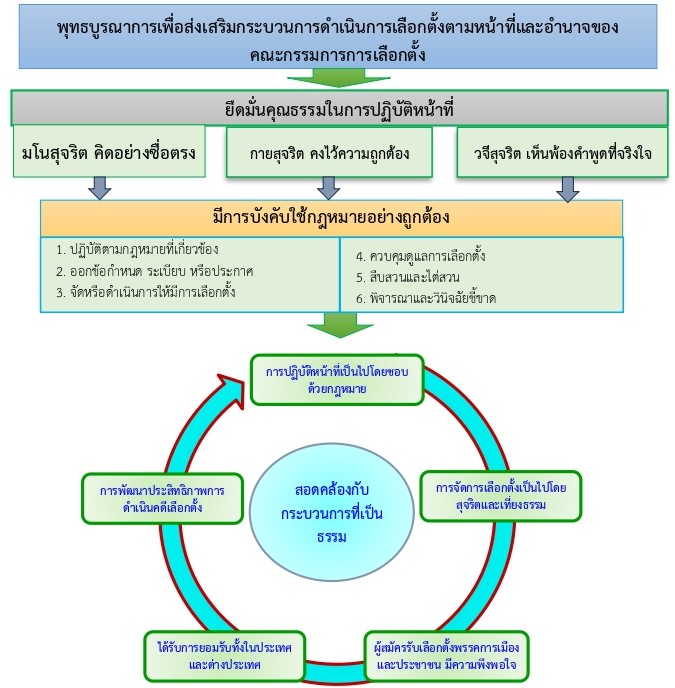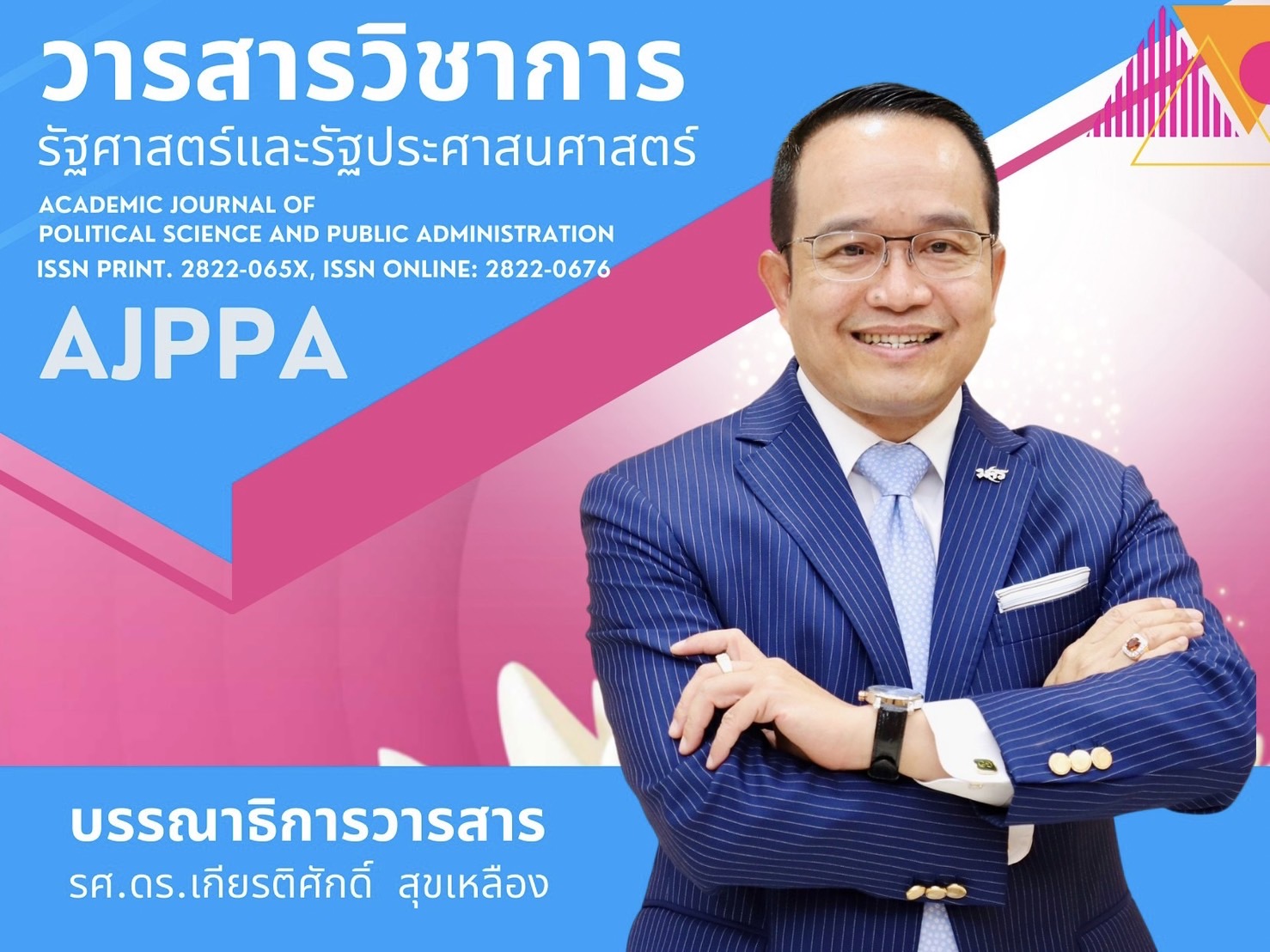พุทธบูรณาการเพื่อส่งเสริมกระบวนการดำเนินการเลือกตั้งตามหน้าที่และอำนาจของคณะกรรมการการเลือกตั้ง
คำสำคัญ:
พุทธบูรณาการ, กระบวนการดำเนินคดีเลือกตั้ง, หน้าที่และอำนาจ, คณะกรรมการการเลือกตั้งบทคัดย่อ
บทความวิจัยนี้มีวัตถุประสงค์เพื่อ 1. ศึกษากระบวนการดำเนินการเลือกตั้งตามหน้าที่และอำนาจของคณะกรรมการการเลือกตั้ง 2. ศึกษาปัจจัยที่ส่งผลต่อกระบวนการดำเนินการเลือกตั้งตามหน้าที่และอำนาจของคณะกรรมการการเลือกตั้ง และ 3. นำเสนอพุทธบูรณาการเพื่อส่งเสริมกระบวนการดำเนินการเลือกตั้งตามหน้าที่และอำนาจของคณะกรรมการการเลือกตั้ง รูปแบบการวิจัยแบบผสานวิธี การวิจัยเชิงคุณภาพใช้วิธีการสัมภาษณ์เชิงลึกผู้ให้ข้อมูลสำคัญแบบเจาะจง จำนวน 18 รูปหรือคน และการสนทนากลุ่มเฉพาะแบบเจาะจง จำนวน 8 รูปหรือคน การวิจัยเชิงปริมาณใช้แบบสอบถามที่มีค่าความเชื่อมั่นทั้งฉบับเท่ากับ 0.974 เก็บข้อมูลจากกลุ่มตัวอย่าง จำนวน 258 คน กำหนดขนาดกลุ่มตัวอย่างจากสูตรของ Taro Yamane ที่ระดับความเชื่อมั่น 95% วิเคราะห์ข้อมูลโดยหาค่าความถี่ ค่าร้อยละ ค่าเฉลี่ยส่วนเบี่ยงเบนมาตรฐาน และการวิเคราะห์การถดถอยพหุคูณ
ผลการวิจัยพบว่า 1. ระดับกระบวนการดำเนินการเลือกตั้งตามหน้าที่และอำนาจของคณะกรรมการการเลือกตั้ง ภาพรวมอยู่ในระดับมาก มีค่าเฉลี่ยเท่ากับ 3.98 มีค่าเฉลี่ยมากที่สุด ได้แก่ การปฏิบัติหน้าที่เป็นไปโดยชอบด้วยกฎหมาย การจัดการเลือกตั้งเป็นไปโดยสุจริตและเที่ยงธรรม การได้รับการยอมรับทั้งในประเทศและต่างประเทศ ผู้สมัครรับเลือกตั้ง พรรคการเมือง และประชาชนมีความพึงพอใจ และการพัฒนาประสิทธิภาพการดำเนินคดีเลือกตั้ง 2. ปัจจัยที่ส่งผลต่อกระบวนการดำเนินการเลือกตั้งตามหน้าที่และอำนาจของคณะกรรมการการเลือกตั้ง 1. หน้าที่และอำนาจของคณะกรรมการการเลือกตั้ง 4 ด้าน คือ สืบสวนและไต่สวน ปฏิบัติหน้าที่ตามกฎหมาย จัดหรือดำเนินการจัดให้มีการเลือกตั้ง ควบคุม กำกับดูแลการเลือกตั้งส่งผลต่อกระบวนการดำเนินการเลือกตั้งตามหน้าที่และอำนาจของคณะกรรมการการเลือกตั้งตามลำดับ มีนัยสำคัญทางสถิติระดับ 0.01 แสดงร่วมกันทำนายกระบวนการดำเนินการเลือกตั้งของคณะกรรมการการเลือกตั้ง ได้ร้อยละ 68.0 2. หลักสุจริต 3 ส่งผลต่อกระบวนการดำเนินการเลือกตั้งตามหน้าที่และอำนาจของคณะกรรมการการเลือกตั้งมี 1 ด้าน คือ มโนสุจริต มีนัยสำคัญทางสถิติระดับ 0.01 แสดงว่าหลักสุจริต 3 สามารถร่วมกันทำนายกระบวนการดำเนินการเลือกตั้งของคณะกรรมการการเลือกตั้ง ได้ร้อยละ 22.00
เอกสารอ้างอิง
กรณัฐ ระงับทุกข์. (2564). การพัฒนาความเป็นพลเมืองในระบอบประชาธิปไตยของประชาชนที่มีผลต่อการเลือกตั้งทั่วไปในกรุงเทพมหานคร (ดุษฎีนิพนธ์ปรัชญาดุษฎีบัณฑิต สาขาวิชารัฐศาสตร์). พระนครศรีอยุธยา: มหาวิทยาลัยมหาจุฬาลงกรณราชวิทยาลัย.
ธีรภัทร เสรีรังสรรค์. (2548). การประเมินผลการทางานขององค์กรอิสระตามรัฐธรรมนูญ : คณะกรรมการการเลือกตั้ง. กรุงเทพฯ: สถาบันพระปกเกล้า.
ประพันธ์ นัยโกวิท (2551). บทบาทและอำนาจหน้าที่ของคณะกรรมการการเลือกตั้ง. กรุงเทพมหานคร : สำนักงานคณะกรรมการการเลือกตั้ง.
พงศ์พัฒน์ จิตตานุรักษ์. (2561). ตัวชี้วัดสุจริตธรรมการปฏิบัติงานที่ปลอดการทุจริตขององค์กรปกครองส่วนท้องถิ่นไทย กรณีศึกษาเทศบาลตำบลบ้านกลาง จังหวัดลำพูน (รายงานการวิจัย). พระนครศรีอยุธยา: มหาวิทยาลัยมหาจุฬาลงกรณราชวิทยาลัย.
พระพรหมบัณฑิต (ประยูร ธมมจิตโต). (2560). กัณฑ์เทศน์ สุจริตธรรมกถา. โครงการป้องกันการทุจริตตามแนวทางพระพุทธศาสนา ขับเคลื่อนโดยความร่วมมือระหว่างสำนักงาน ป.ป.ช. กับมหาวิทยาลัยมหาจุฬาลงกรณราชวิทยาลัย. พระนครศรีอยุธยา: มหาวิทยาลัยมหาจุฬาลงกรณราชวิทยาลัย.
พหลวัฑฒิ์ อินทรบุญสม. (2564). มาตราการทางกฎหมายในการดำเนินการเลือกตั้งของประเทศไทย (วิทยานิพนธ์นิติศาสตร์ดุษฎีบัณฑิต สาขาวิชานิติศาสตร์). กรุงเทพฯ: มหาวิทยาลัยธุรกิจบัณฑิตย์.
มหาจุฬาลงกรณราชวิทยาลัย. (2539). พระไตรปิฎกภาษาไทย ฉบับมหาจุฬาลงกรณราชวิทยาลัย. กรุงเทพฯ: โรงพิมพ์มหาจุฬาลงกรณราชวิทยาลัย.
สำนักงานคณะกรรมการการเลือกตั้ง. (2566). ข้อมูลบุคลากรที่เกี่ยวข้องกับกระบวนการดำเนินการเลือกตั้ง. กรุงเทพฯ: หจก.สหายบล็อกและการพิมพ์.
Henriquezco, J.O. (2010). “Electoral Justice”, An Overview of the International IDEA Handbook. Stockholm: Bulled Graphics Press.

ดาวน์โหลด
เผยแพร่แล้ว
รูปแบบการอ้างอิง
ฉบับ
ประเภทบทความ
หมวดหมู่
สัญญาอนุญาต
ลิขสิทธิ์ (c) 2024 วารสารวิชาการรัฐศาสตร์และรัฐประศาสนศาสตร์

อนุญาตภายใต้เงื่อนไข Creative Commons Attribution-NonCommercial-NoDerivatives 4.0 International License.




